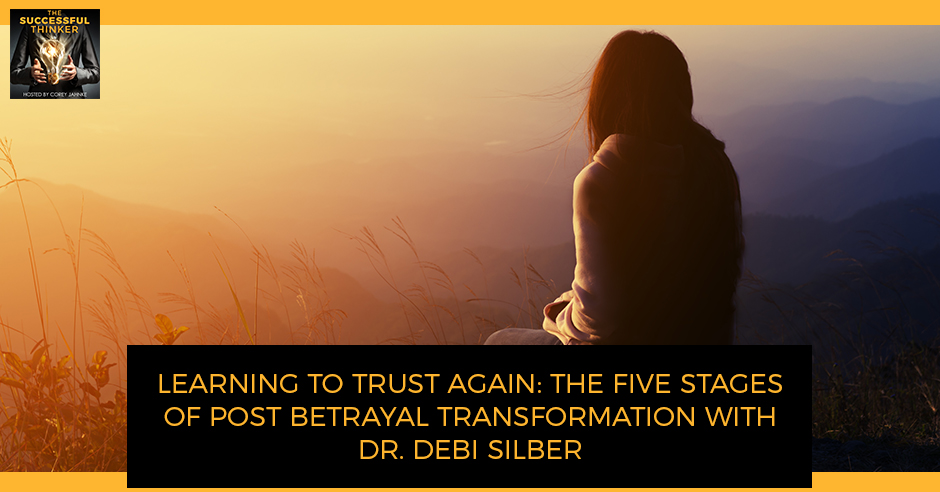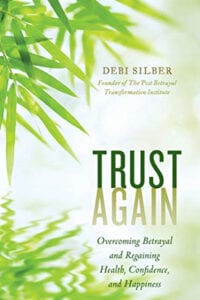
If you’re ever experienced some form of betrayal, you would know how hard it is to learn how to trust other people again. But there is such a thing as post betrayal transformation (PBT) and it follows a definite healing process. Holistic psychologist, health, mindset, and personal development expert, and motivational speaker, Dr. Debi Silber spent much of her career studying this process to help people overcome what she calls “post betrayal syndrome.” Debi is the president and CEO of the PBT Institute. She is also a bestselling author who has just recently released her latest book, Trust Again. In this conversation with Corey Jahnke, she outlines the five distinct stages of PBT and explains where people usually get stuck. Do you think you have post betrayal syndrome? Listen in to learn how you can find out where you are in the process and how Debi’s programs can help you start in this transformative healing journey.
—
Listen to the podcast here:
Learning To Trust Again: The Five Stages Of Post Betrayal Transformation With Dr. Debi Silber
Our guest is someone different because she’s talking about something that I’ve never heard of before. I’m impressed because when I first saw her first TEDx video, she completely blew me away. Her name is Dr. Debi Silber. She’s the Founder of The Post Betrayal Transformation Institute. She’s a holistic psychologist, a health mindset and personal development expert, the author of the number one bestselling book, The Unshakable Woman: 4 Steps to Rebuilding Your Body, Mind and Life After a Life Crisis. Her latest book is called Trust Again.
Her PhD study on how we experience betrayal made three groundbreaking discoveries that change how long it takes to heal. In addition to being on Fox, CBS, The Dr. Oz Show, TEDx twice and more, she’s an award-winning speaker, coach, and author dedicated to helping people move past their betrayals as well as any other blocks preventing them from the health, work, finances, relationships, confidence, and happiness they want most. It sounds like something us Successful Thinkers have been dying to hear about. Dr. Debi Silber, welcome to the show. Tell us a little bit about your story.
Thank you. I’m looking forward to this conversation. You don’t study something like betrayal unless you need to. I had a horrible family betrayal. I thought I learned everything I was meant to learn from that experience, but I wasn’t. I had another opportunity, and this time it was my husband. I was blindsided, shocked, and devastated. I got him out of the house and I thought, “What’s common between these two experiences?” I realized that I never took my own needs seriously. I was never on my own to-do list. I had four kids and six dogs and this thriving business, but it wasn’t about me.
One of the first things I did was enroll in a PhD program in Transpersonal Psychology. That’s the psychology of transformation and human potential because I was changing and I didn’t quite understand it. He was on his own too. That was nice and all, but this was about me. While I was there, I did a study and I studied betrayal. What holds us back, what helps us heal, and what happens to us physically, mentally, and emotionally when the people closest to us lie, cheat and deceive. That study led to three groundbreaking discoveries, which changed my business, my life, and everything.
Can you tell us a little bit about those three groundbreaking discovery?
The first one was I had been through the death of a loved one. I had been through disease, but betrayal felt different for me. Originally, I was studying something called post-traumatic growth, which is the upside of trauma, how that trauma leaves you with a new awareness, perspective and insight. Betrayal felt different, but I didn’t want to assume. I asked all of my study participants and I said, “If you’ve been through other traumas besides betrayal, does it feel different for you?” Hands down unanimously, they said, “It’s different.” It needed its own name, which is now called post-betrayal transformation. The reason why it’s different is, let’s say you lose someone you love. You grieve. You’re sad. You mourn the loss, but you don’t necessarily take it personally. It doesn’t feel like a personal attack and it’s not an attack to the self. With betrayal, it feels so intentional so we take it personally. The entire self has to be rebuilt.
Confidence is shattered. Rejection, abandonment, belonging, worthiness, trust, all of those things, which are huge, have to be rebuilt. That was the first discovery. The second one blew my mind. What we found was while we can stay stuck for years, decades, lifetime, and many of us do, if we’re going to heal, we will go through five proven predictable stages. What’s even better and more exciting about that is we also learned what happens physically, mentally, and emotionally at each one of those stages. We know what it takes to move from one stage to the next. The best part about that one was now we know healing is predictable. We know that if someone knows where they are and they’re willing to do certain predictable things, they will move from one stage to the next.
The third discovery was a shocker too. There’s a collection of symptoms so common to betrayal. It’s now known as Post Betrayal Syndrome. We have a quiz on the site to see to what extent someone is struggling. We have every age in about every country represented. We’ve had close to 8,500 people who took the quiz at this point. There’s a question that reads, “Is there anything else you would like to share?” Besides reading about the physical, the mental, the emotional, all the different symptoms left in the wake of this type of trauma. People write things like, “My betrayal happened years ago and I can still feel the hate. I’m unwilling to trust and it feels like it happened yesterday.” That saying, “Time heals all wounds,” not when it comes to betrayal. Betrayal heals when we face it, feel it and heal it. That’s uncomfortable to do. This is deeply painful work, but that’s the only way through it.

Post Betrayal Transformation: We cannot experience a state of post betrayal transformation if we’re unwilling to get uncomfortable.
It’s an amazing thing that you said that people can feel this up to many years ago. Do you find those people in a whole life pattern? Do you see patterns amongst people that hold onto it for very long?
I do. Out of the five stages, we see this the most. This is a classic of stage three. What this is, is where we’ve survived our experience. We start believing that this is as good as it gets and it’s interesting because we have two people who come into our membership community. There’s the group who’ve just been blindsided. They’re shocked. They’re overwhelmed. They’re clearly struggling, but then this isn’t even a bigger group. This accounts for more people than we give credit to. These are the people who they’re not happy with their health, with their body, with their relationships, with their work, with their lives, but they’re surviving. That’s it. My first TEDx was about how we numb, avoid distract ourselves using things like food, drugs, alcohol, work, TV, and keeping busy.
This group is the group who does that because they’re not happy, but they’re not facing any of these. They’re not driving and going to do the work. They may not even be aware that this is at the root of it. What they’re doing is, they’re doing anything to avoid these painful and uncomfortable feelings. On top of a betrayal that could have happened decades ago, where that person doesn’t know, care, or even remember what they did, here we are years later living in a way that we’re not happy with any aspect of life because of the habits we’ve created around how we’ve chosen to deal and not deal with it.
They go into it a complete numbing and avoidance behavior.
They could stay there forever.
You said that they don’t even know it. What questions can we ask ourselves to see if we are those types of behaviors?
These are the four questions that I encourage everybody to ask themselves. Number one, am I numbing and distracting? If so, how? Be honest with yourself. Do you walk into a room and you put the TV on right away because you are desperately hoping to drown out the sound of your own thoughts? Do you walk into the kitchen and you reach into the cabinets to stuff yourself to stop the pain? Call yourself down on it. Number two, what am I pretending not to see? Am I pretending not to see there’s trouble in my relationship? Am I pretending not to see that health issue that needs my attention? Am I pretending not to see that I hate my job? The third question, what’s life going to look like in 5 to 10 years if I do nothing? Play it full out. Take that relationship issue you’re ignoring, that health issue or that job, play it 5 to 10 years, what’s that going to look like? The last question, what can life look like in 5 to 10 years if I change now? I’m not saying it’s easy, but transformation begins when we tell ourselves the truth.
Those are wonderful questions. I love the idea of pretending not to see because I get this image of skirting past the bathroom mirror or it’s just a fascinating deal. We ask ourselves those questions. Do you recommend a journal or play them out with a person? How do you recommend someone do that?
Time doesn’t heal betrayal. Face it, feel it, heal it. Share on XI think it’s a personal process. Transformation is very personal. I always think about the caterpillar turning into the butterfly. The caterpillar on some random Tuesday is done being a caterpillar. Think about the symbolism here. It hangs itself from a branch in order to die to the life it’s known. Talk about the symbolism. It wraps this cocoon around itself, so it can be undisturbed. If you were to go over to that chrysalis cocoon while it’s in this state, it shakes a little bit as if to say, “Buzz off, I am busy.” Think about what the caterpillar undergoes. It’s willing to be emulsified, deconstructed, unrecognizable from anything it once was. Only because it went through that process does it get to emerge as one of the most beautiful creatures on our planet, the butterfly. The caterpillar cannot turn into the butterfly if it doesn’t go through that process. We cannot experience that state of post-betrayal transformation if we’re unwilling to get uncomfortable.
What do you think it is about the betrayal that causes it to hurt so much? What does it impact and what does it create?
These are the people we trusted the most. This is the person who said, “I got you. You’re safe here. You can trust me.” That’s the person who does it. This person who you put your faith, trust, heart, and time into, they take their mask off saying, “This is who I’ve been.” The way it works with betrayal is the more we trusted and the more we were dependent on this person, the deeper the betrayal. Let’s take a child, for example, who is dependent on their parent. That’s going to have a bigger impact than your friend sharing your secret. It’s still going to have an impact. You’re still going to have some cleanup to do, but not nearly to the same extent. These betrayals hurt because these were the people who we trusted.
You can even see that in animals sometimes. What do you think some of the physical, emotional and mental symptoms are when a person has experienced that betrayal?
These are all classics of the Post Betrayal Syndrome. There are many within each category and what we saw. These are some of the most common physical symptoms. These statistics are pulled from around 8,400 to 8,500 people who’ve taken the Post Betrayal Syndrome quiz, 71% have low energy, 68% have sleep issues, 63% extreme fatigue, 47% weight changes, and 45% experience digestive issues. I found the digestive issue interesting. Look at what the digestive system does. It absorbs, digests, and processes food. Isn’t a betrayal difficult to absorb, digest, and process? Is it any wonder why the gut would be off?
Those are the physical ones. These are some mental symptoms, 78% are overwhelmed, 68% are unable to focus, 64% are in shock, 62% are unable to concentrate. Mix some of those mental symptoms with some of those physical symptoms. Add in some of the emotional ones, 88% experience sadness, 83% experience anger. If you mix anger and sadness alone, that’s a lethal combination, 82% are hurt, 80% are anxious, and 79% are stressed. These last few I found so interesting, 84% have an inability to trust, 82% find it hard to move forward, and 90% want to move forward, but they don’t know how.
You get the image in the movie where the guy keeps talking about his past girlfriend and you’re sitting there and you’re going, “Shut up.” This is deep stuff. It’s rooted in a physiological level. The digestive system part fascinates me. I liked the angle that you drew into digesting what happened.
This hits us on every level. This is the reason why I opened up The PBT Institute, the membership community because what I see people doing, and still doing, are three things. They numb, avoid and distract. They run to their doctor to put them on mood stabilizers or antianxiety medications. They drink, eat, binge watch TV, or they join some support group where it’s all about bashing and keeping you down. If you start feeling better, you’ve outgrown the group and you don’t belong, or they go to therapy. If that therapist isn’t highly skilled in helping someone heal from a betrayal, it can do more harm than good. I saw a need for something so much more effective.

Post Betrayal Transformation: Keeping everyone at a distance to protect yourself from hurt is not strength; it is unhealed betrayal.
I love how you don’t want to stay at syndrome. You want to move to transformation. What are the five stages from betrayal to the breakthrough that you mentioned?
This is what I saw with every single study participant, I included. If you imagine four legs of a table, the four legs being physical, mental, emotional, and spiritual. What I saw with everybody was a real heavy lean on the physical and the mental, and neglecting the emotional and the spiritual. What does that look like? It looks like we’re good at thinking and doing, and not paying much attention to the feeling and being. That’s where intuition lies and it would have served us. That’s stage one. It is a setup stage. Stage two, and this is the shock. Here’s where we’re blindsided. This is D-day or the discovery day. The breakdown of the body, the mind, the worldview. By far, this is the scariest stage. You’ve ignited the stress response.
You’re headed for every single stress-related symptom, illness, condition, and disease. Your mind is in a complete state of chaos and overwhelm. None of this makes sense. You don’t understand what happened. Your worldview has been shattered. Your worldview is your mental model. It’s the rules. It was like, “These people are saved. Don’t go here. This is how it works.” In a moment, the bottom has bottomed out on you. There’s not a new set of rules that’s been constructed yet. This is terrifying but think about it. If you were walking down the street and the bottom were to bottom out on you, what would you do? You’d grab hold of anything and everything you could to stay safe and stay alive. That’s stage three, survival instincts emerge. It’s the most practical stage. How will I survive this experience? What do I do? Who can I talk to? Who can I trust?
This is what I was talking about before. Because stage three feels so much better than the terrifying fear of stage two, we think it’s good. We look at it like, “I’ve survived that. Let me get cozy here. Let me set up a shop here. Let me stay here.” What happens is the longer you’re here, the deeper the roots, and then you start getting all these small self benefits from being here. You get to be right, you get someone to blame, and you get a target for your anger. You don’t have to do the hard work of learning to trust again, “Do I trust you? Forget it, I don’t trust anybody.” What happens is your mind starts saying, “Maybe I deserved it. Maybe I’m not all that.”
Like energy attracts like energy. Now you’re calling situations, circumstances, and people to you to confirm that this is where you belong. This is where I see people stay and here’s where your betrayal could have happened decades ago, a big betrayal. It could be a misinterpretation or whatever it is. You’ve stayed in this very spot. If you’re willing to let go of those perceived benefits, you mourn the loss of what you want to get and having all of that, you can move to stage four. Stage four is finding and adjusting to a new normal. Here’s where you realize, “My old normal doesn’t exist. I cannot undo this betrayal, but what I can control is what I do with it.”
This is like if you’ve ever moved into a new house, office, condo, apartment and all your stuff aren’t there. It’s not cozy yet, but it’s going to be okay. When you’re in this space, you’re turning down the stress response. You’re not physically healing just yet, but you’re not causing the massive rapid damage you were causing in stages 2 and 3. You’re also creating new rules and new boundaries. What’s interesting, if you were to move, you don’t necessarily bring everything with you. You don’t bring the things that don’t represent the version of you that you want to be in this space. What I saw moving from stage 3 to stage 4, if your friends weren’t there for you, if it was a one-sided friendship, you don’t take them with you.
Here’s where you outgrow them. You don’t feel right with them anymore. It’s common. When we’re on stage four, we’ve made it okay. We’re making this our new normal. We can move into the fifth most beautiful stage and this is healing, rebirth and a new worldview. Your body starts to heal. You’re eating well. You’re exercising. You didn’t have the bandwidth for self-love and self-care. You were surviving. Now you do. You’re making new rules, new boundaries based on where you’ve been. You have a new worldview based on your experience. The four legs of that table that we were only prioritizing the physical and the mental, now we’re solidly grounded because we’re focused on the emotional and the spiritual too. Those are the five stages.
It’s amazing how well thought out that is. I can think of the person who doesn’t go through all that work and what they do is then they latch on to some Band-Aid cure halfway through it and think that they’re fixed.
Posttraumatic growth plus rebuilding the self equals post betrayal transformation. Share on XThat’s stage three. That’s where many people stay for a lifetime. They haven’t even experienced transformation yet. They’re thinking that’s as good as it gets.
I’m glad you’re out there helping people. The one thing that was interesting when you were listing off the different things that people do, binge-watch and so forth, how do we know what Post Betrayal Syndrome is and if we have it?
I would say, take the quiz because you’ll see to what extent you’re struggling. Here’s how to know if you have an unhealed betrayal. There are the physical symptoms as I mentioned, the mental and emotional, but here’s how you see it in everyday practical situations. Here’s how you see it in relationships. I see it in two ways. Number one, the first way is when you have repeat betrayals. The face has changed, but it’s the same thing. It’s a different partner, but it’s the same scenario. It’s a different boss, but it’s the same experience. It’s a different friend, but the same thing keeps happening. You say to yourself, “What the heck? Why is it that this keeps happening? Is it me?” Yes, it’s you because you keep bringing the same version of you into every experience.
Unless that changes, it’s like the universe is saying, “I keep giving you an opportunity to learn this and you don’t. It’s okay. I’ll keep giving you more opportunities until you do,” until the mother of all betrayals where you say, “I am never doing this again. I won’t tolerate that again, whatever it is, lesson learned.” If it’s a repeat betrayal, it’s an unhealed betrayal. That’s the first way. The second way is when you put that big wall up and said, “No one’s getting near me again. They’re not getting close to my heart again. I’ve been there, done that, and I am not doing it again.” People think this is a strength like, “Look how strong I am. I’m not letting anybody get close to me.” It’s not. It’s an unhealed betrayal. If we keep everyone at a distance and if we don’t allow ourselves that intimacy, that depth of connection, that closeness that we could feel with deep relationships, it’s like half the life.
If you’re doing that, know that that’s an unhealed betrayal. You’re protecting yourself. It’s understandable why, but you need to learn how to trust again. That’s why I wrote the book, Trust Again. We see it in health too, where someone goes to the most well-meaning doctors, coaches, healers, therapists to manage a stress-related symptom, illness, condition disease, and the root of it can be an unhealed betrayal. We see it at work too, where your confidence was shattered. You don’t have the confidence. You deserve that raise or promotion, but you don’t have the confidence to ask and you’re bitter and resentful instead. You don’t have the confidence to make that phone call, to go to that networking event, and putting yourself out there in whatever way because of your confidence or trust was shattered. How do you trust your boss or coworker? You want to be a team player, but you’re terrified. You want to do that joint venture with someone or that collaborative project, but you don’t trust. These are all the ways that you’d see that there’s an unhealed betrayal there.
That’s fascinating because I was visualizing several people that I know who say things like, “Why does this keep happening to me?” As a professional pharmacist, it’s been interesting because I’ve been a pharmacist in the same community for years. I’ve seen 1 or 2 people with the same partner, even though they had a different face over the years. It struck a chord in me when you said that. Let’s talk a little bit about getting past this. How do we heal? What is exactly the post-betrayal transformation and how is it different from post-traumatic growth?
Post-traumatic growth was how that trauma, no matter what it is, the trauma of the death of a loved one, disease, the devastation of some kind, leaves you with that new awareness inside perspective, but with the shock and pain of betrayal, there is that need to rebuild yourself. If I had to come up with an equation, it looks like this, post-traumatic growth plus rebuilding the self equals post betrayal transformation. That’s why when someone truly heals from betrayal, they are the strongest people I know. These are people who have completely rebuilt themselves. Rebuilding yourself is an option, whether you rebuild yourself and move on. That’s what I did with my family. It wasn’t an option to rebuild with them, or if the situation lends itself, if you’re willing and you want to, you rebuild something entirely different from the person who hurt you. That’s what I did with my husband. We married each other again, new rings, new vows, and a new dress. Our four kids are our bridal party. I’ve done both sides of this. They’re very different, but whatever way you choose, you can rebuild yourself regardless.
I can’t help but wonder where forgiveness fits into all of this?

Post Betrayal Transformation: Trust Again: Overcoming Betrayal and Regaining Health, Confidence, and Happiness
Forgiveness is huge, but what I’ve also found is when you do it too early, it backfires. Forgiveness is about us. It has nothing to do with the other person. What we’re doing when we forgive is, we’re letting go of the power that this pain has over us, but having said that, it’s not an easy thing to do. Many people move towards forgiveness as a way to get it over with or to move on. I remember one of the studies that I read when I was preparing my study and it was talking about when you feel safe and valued and you forgive, you feel better. When you do not feel safe and valued and you forgive, you feel worse. I take it a step further in trust again. I’d say, what would happen if you change the word forgiveness to reconcile with a family member, partner, friend, coworker, and it would sound like this. If you feel safe and valued and you reconcile, you feel better. If you do not feel safe and valued and you reconcile, you feel worse. I’m sure a lot of the people you’re talking about who came into your pharmacy did not feel safe and valued and reconciled and felt worse.
I can see the look on their face that tells me you’re correct. A lot of times, people could fool themselves easily into thinking, “I’ve beaten this,” but how do we know if we haven’t healed?
Betrayal follows you around like a shadow unless you dive in and do the work. There were three groups in the study who did not heal. Anybody, see if you’re in one of these groups. This was interesting. As a researcher, you’re not supposed to assume anything, but I was new. I was doing my best here, but I assumed that the people who were the hardest hit would grow the least because they had the most to overcome. I was dead wrong. That had nothing to do with it at all. One of the groups who didn’t heal was the group that ran to their doctor to put them on mood, stabilizers, antianxiety medications, or they drank, used food or TV, anything to numb.
I wouldn’t say, “Don’t take something. Don’t do something,” but what I clearly saw was when they did, they didn’t heal nearly as well, or as quickly as the ones who just put their head down. They said, “I’m not picking my head up until I’m out the other side.” That was the first group. The second group refused to accept their betrayal. They were kicking and screaming and carrying on. I could talk about the house analogy if you remember in the TEDx. That explains that. The third group was interesting as well. This was the group where the betrayer had no consequences. Whether it was for religious reasons, financial fear, just fear, not wanting to break up a family, they chose to overlook it and try to put it behind them. Tell that to your broken heart. It doesn’t work like that. Not only did I see a further deterioration of the relationship, but this group was also by far hands down the most physically sick.
I can’t imagine because I’m wondering if you’re sitting there still in the relationship with the person who betrayed you, but you’re not working towards healing.
That’s tragic to the body and mind.
At some point, it must turn into some sort of self-betrayal.
It is. It’s a great realization because there’s a huge link between betrayal and self-betrayal. What comes first? It could be that you don’t value yourself so you choose somebody who doesn’t value you. It could be you were devalued and then you don’t stand up for yourself. You don’t speak up. You put up with something that you know is not in your highest and best good. People do this because it’s scary to bring your relationship to the absolute death and destruction of what it was. It’s only from that space can you rebuild and birth something entirely new. People are afraid of that major change, it is way too scary. What they do is they’re staying in that stage three. They are too afraid to let it all go because you don’t know what’s going to show up. When I was with my husband, he was out of the house. I had no idea what was going to happen. I was like, “Let’s see how I do. I’m a single mom now who’s going back for a PhD and working in and with the kids.” My intention was to heal, but it’s only from that space can you birth something new.
Stop blaming yourself. Betrayal happened to you, not because of you. Share on XWhat does that healing process look like? What do we need to do to move forward and heal?
It’s different for everybody because there are many factors. The biggest factor is your own willingness. Here’s what I found. If you are unwilling to let go of that story and all the benefits that you receive from it, it doesn’t matter. You could be doing every process under the sun, having as much support as possible, going to every counselor, therapist, coach, it won’t make a difference. If you have such a vested interest in keeping that story alive, you’re not going to heal. Willingness is huge. After willingness, it’s what tools are you taking on? What processes? What are you moving towards? What are you doing to move closer to healing every day? I know many people who take the quiz, there’s a question I ask them, “On a scale of 1 to 10, how ready are you to heal?” If I tell you almost everybody says ten and a fraction of them joined our membership community. I find it interesting because they’re in so much pain, but when it comes to doing something about it, they’re not willing.
I found it fascinating, the sentence that you used that said, “If you’re willing to change your story and all the benefits of that story.” I know what you mean by that, but can you please share your definition of what that was about?
Look at my story. I was betrayed by the very people that I placed the greatest trust in. Anybody I trusted betrayed me. The most important people in my life betrayed me. That was a powerful story. If I would have shared that with anybody, they would have given me sympathy and they would have felt bad for me and all of these things. I had that story, but I was like, “This story stinks.” What would happen if I create a much better story? I did. I didn’t do anything that someone else couldn’t do, but what happens is when you let go of the story and those small self benefits, think of what you gain.
You get a way better story. You get to be the hero or heroine of your story. You improve your immune system. You physically heal. You stop this accelerated aging that’s going on. You get opportunities that you didn’t have access to when you were so blocked by the pain of your old story. It’s a much different story, but it’s so much better. With me, I thought about it. I said, “The injustice of this will eat me up alive, but if I heal and when I heal and I have a much better story, then you have something good that you’re doing with something bad.” I think you owe it to yourself. If something bad happens, do something good with it.
I liked the idea that you would not have to keep pretending not to see something if you moved on. Debi, you mentioned the quiz. How does a person go about finding the quiz and getting in more touch with you and working with your institute?
They could go to ThePBTInstitute.com/quiz.
They would take the quiz and get a sense as to where they are and then you will reach out to them to follow up. I want you to know that I admire the work that you’re doing because I can see that many people probably have multiple levels of betrayal going on and helping people work past the hurting that they may not even recognize that they’re going through as a phenomenal life endeavor. Congratulations on that.

Post Betrayal Transformation: Forgiveness is all about you. It has nothing to do with the other person.
Thank you.
I want to thank you for being on our show. Is there one last takeaway or one nugget that you want to share with the audience?
I know firsthand how painful it is. What I would love everybody to truly understand, even if you have to say it a hundred million times, even though it happened to you, it’s not about you.
A lot of times, people blame themselves for the other person’s actions. The other person, like in your case, would have had to dealt with something large in his life or the dumbest man alive.
Lesson learned. This was our situation. As my kids see so much from this and we’ve grown all so close because of it, they said, “Mom, you took one for the team. We all learn so much.”
Successful Thinkers, I want you to read this one over and over because I believe that you’ll find something in here that can help you strengthen your worldview and understand that you have the ability to make new rules and to get past the things that are holding you back. I believe in you. I bless you. Thank you and have a wonderful day, Successful Thinkers.
Important Links:
- The Post Betrayal Transformation Institute
- The Unshakable Woman: 4 Steps to Rebuilding Your Body, Mind and Life After a Life Crisis
- Trust Again
- TEDx – Stop Sabotaging Yourself
- https://ThePBTInstitute.com/
- https://www.YouTube.com/watch?v=iyqOR69dHiU
- https://www.YouTube.com/watch?v=XX30i6nC7ro
- https://ThePBTInstitute.com/quiz/
About Dr. Debi Silber
 Dr. Debi Silber, President/CEO of The Silber Center for Personal Growth and Healing and The PBT Institute (Post Betrayal Transformation Institute) in New York and founder of www.PBTInstitute.com is a Transformational Psychologist, an award winning speaker, a recognized health, empowerment and personal development expert. She’s a speaker, coach and author of the Amazon #1 Bestselling book: The Unshakable Woman: 4 Steps to Rebuilding Your Body, Mind and Life After a Life Crisis, The Unshakable Woman-The Workbook (a companion guide to the book), as well as 2 books recommended by Brian Tracy, Marshall Goldsmith, Jack Canfield and many more.. In addition to being a highly credentialed and awarded health expert, Debi has contributed to FOX, CBS, The Dr. Oz show, TEDx, The Huffington Post, Shape, Self, Health, Working Mother, Forbes, Psychology Today, WebMD, Yahoo Shine, Ladies Home Journal, Woman’s World and Glamour to name a few. Based on a PhD study on how women experience betrayal, she’s created a multi pronged approach that helps others heal so they become their physical, mental, emotional and spiritual best.
Dr. Debi Silber, President/CEO of The Silber Center for Personal Growth and Healing and The PBT Institute (Post Betrayal Transformation Institute) in New York and founder of www.PBTInstitute.com is a Transformational Psychologist, an award winning speaker, a recognized health, empowerment and personal development expert. She’s a speaker, coach and author of the Amazon #1 Bestselling book: The Unshakable Woman: 4 Steps to Rebuilding Your Body, Mind and Life After a Life Crisis, The Unshakable Woman-The Workbook (a companion guide to the book), as well as 2 books recommended by Brian Tracy, Marshall Goldsmith, Jack Canfield and many more.. In addition to being a highly credentialed and awarded health expert, Debi has contributed to FOX, CBS, The Dr. Oz show, TEDx, The Huffington Post, Shape, Self, Health, Working Mother, Forbes, Psychology Today, WebMD, Yahoo Shine, Ladies Home Journal, Woman’s World and Glamour to name a few. Based on a PhD study on how women experience betrayal, she’s created a multi pronged approach that helps others heal so they become their physical, mental, emotional and spiritual best.


